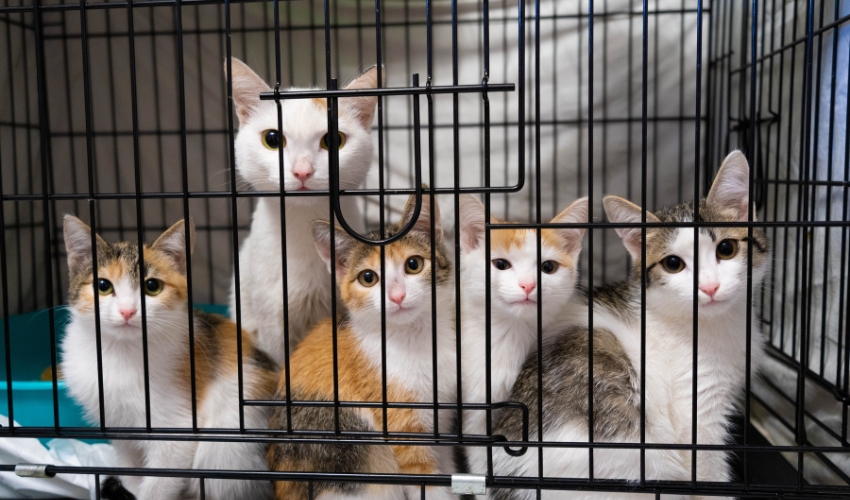All cats are prone to getting FIV, and kittens get FIV mostly from their parents. Felines are one of the most adorable creatures you could ever take care of, but despite that, you need to be ready for the complications that come along with their playfulness.
However, is it really common for cat babies to contract this disease from their dads? The simplest answer to this is no. Even for mothers, it is rare to spread FIV to their kittens. FIV is generally difficult to transmit, yet the possibility is still there.
It truly is scary if your cats get diagnosed with FIV, but remember that a positive FIV test doesn’t immediately mean that the cat has FIV — it might mean that there are just antibodies present. If you suspect your kitten has FIV, read below and learn a few things that might enlighten you.
What is FIV?
The Feline Immunodeficiency Virus (FIV) is a disease that attacks the immune system and affects cats worldwide, similar to HIV. FIV-positive cats are more prone to infection since the virus assaults and destroys their immune system. Because it can cause immunosuppression, FIV is frequently confused with Feline Leukemia Virus (FelV), which can also cause cancer, anemia, and kidney failure.
FIV is only spread by cats and is hard to disseminate. It’s also a slow-acting virus, so cats usually don’t display any symptoms for years after contracting it. The virus can take a long time to weaken a cat immunologically, but once diagnosed, FIV-positive cats are more susceptible to other infections.
You may familiarize yourself with the symptoms below that may indicate FIV as an underlying cause of diseases:
- Abscesses
- Appetite Loss
- Diarrhea
- Eye Inflammation
- Fever
- General swelling of lymph nodes
- Lethargy
- Leukemia
- Pink Eye/s
- Repetitive Infections
- Salivation
- Seizures
- Stillbirths
- Weakness
- Weight Loss
If your kitten exhibits one or two of the symptoms above, it might not immediately indicate that it contracted FIV. It might be another disease, so it is always best to undergo a check-up for further assurance.
There are four stages of FIV in cats, which are:
- The acute phase is the initial infection that may last one to three months.
- Latent infection shows no condition but can last for years.
- The feline AIDS phase is when they become immunocompromised and are sensitive to secondary diseases.
- Terminal Phase, severe infections may appear here.
How Is FIV Transferred?
As previously mentioned, FIV is a disease hard to spread to others. With proper caution, you can protect your cats from getting it.
Still, knowing what might lead the virus onto your pets is good. So, here are some ways it can get transferred that you should take note of:
- Saliva contact
- Blood transfusion
- Badly infected gums
- Bite wound
- Birthing or milk nursing (rare)
The risk of FIV transmission is low when you live in an environment without aggressive cats. As for those cats diagnosed with FIV, keep them indoors to prevent further contact with other cats.
The probability of FIV in kittens happens mostly with mothers to kittens, yet it is rare. If you want additional assurance, the vet should willingly clarify it once you ask.
What to Do If Your Kitten Gets FIV?

Although FIV might not immediately lead to death, the secondary diseases can compromise a kitten’s life. Still, even with FIV, a cat may be able to live with an average lifespan. The following tips can help you prevent or manage FIV for your felines:
- Choose to spay and neuter your pet
- Keep them indoors as much as possible
- Please keep them in a stress-free environment
- Follow through a healthy balanced diet
- Upon the appearance of problems, consult a vet
- Do not ditch the vet check-ups. Attend those entirely and thoroughly for the sake of your pet’s health
Unlike the 9-in-1 puppy vaccine for dogs, there may not be a complete cure or prevention treatment for FIV. However, cats could still live a healthy life with the help of some treatments.
Remember to not give up on them and provide support throughout their lifetime. As a fur parent, your pets will rely on you when they feel weak and need proper attention. Also, don’t forget to regularly take them to the vet so you can avoid dealing with the secondary diseases that come along with FIV.
Conclusion
Since kittens get FIV mostly by transmission, you can rest assured knowing that they likely wouldn’t get it from their parents. However, remember that it is still a possibility, and if you really want to adopt a fur baby in need, the disease shouldn’t hinder you from taking one into your care whether it is really there or not.
If you’re looking for a trustworthy organization where you can adopt a kitten, Doobert would be your best bet. The team can easily connect you to the right people and provide the details you’ll need for the entire process. If you’re interested, you can also become a volunteer and help the team by reaching out through their website!











